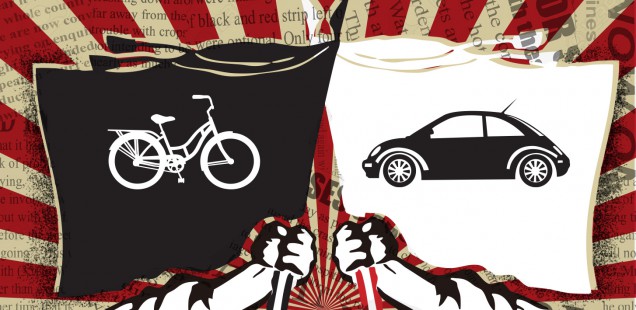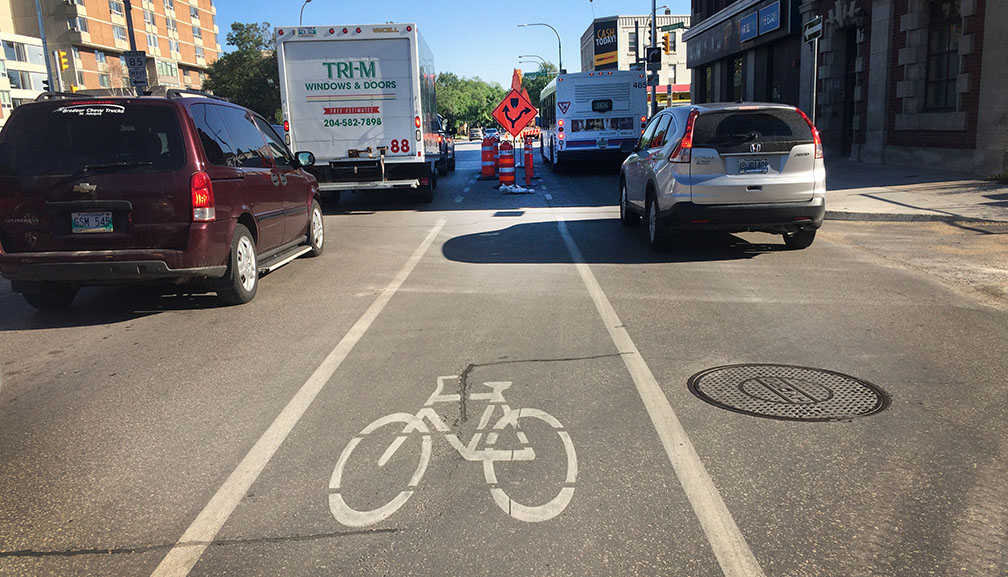
Propaganda and the Fabricated War
I was happily driving home from work on Friday, looking forward to a long summer weekend of gin-induced relaxation, when a chipper voice on CBC radio informed me that according to a recent online poll, “Winnipeggers don’t seem to like cyclists”. I pulled the car over. The voice had my undivided attention.
The poll found that fifty-seven per cent of Winnipeggers think cyclists are “inconsiderate to drivers”, while forty eight percent found them inconsiderate to pedestrians on roads and sidewalks. “There seems to be a road war on the go in Winnipeg”, explained a representative from Probe Research, noting her surprise at the animosity towards cyclists. “I think this poll does show that cyclists perhaps need a little tune-up of their own attitudes”.
Inconsiderate? Tune-up our attitudes? Who commissioned this poll anyway? Miss Manners?
To make matters worse, the story was followed up by a second, equally derogatory one that interviewed a cyclist who was run off a dedicated bike path by another cyclist. She was suitably (and justifiably) pissed. I can only surmise that this unfortunate succession of stories was meant to illustrate that not only are cyclists despised by drivers, they are equally loathed by other cyclists.
Sitting in my car at the side of the road, I considered the spectacular stupidity of it all. Who on earth would commission a poll that asked people what they think of people on bikes? And to what end? Why not a poll asking about the likability of the left handed? Or Capricorns? Worse yet, why would anyone choose to report on this hate-inciting rubbish during rush hour on the Friday before a long weekend, when frenzied commuters are focussed on one thing: getting out of dodge as quickly as possible to sit on the dock with a cold beer.
I have always found the CBC, and the Winnipeg media in general, to be exceptionally sympathetic advocates for active transportation – and yet here, between the weather forecast and a song by The Tragically Hip, the CBC had cheerily and effectively declared open season on cyclists. To say this was out of character is a massive understatement. To say it was disappointing, is an absolute truth, because unlike many media sources, I have come to hold them to a pretty high standard.
Naturally, I find the results of the poll itself both distressing and perplexing, particularly since there was zero context offered. Who commissioned the study? How was it distributed? What was the purpose? Who were the respondents? Am I just inconsiderate and annoying when I’m riding my bike, or all the time? (I will, of course, assume the latter). Personally, I don’t find cyclists particularly inconsiderate or annoying when I’m driving, but in that respect, according to the poll, I am clearly in the minority. I have certainly seen people on bikes exhibit inconsiderate behaviour, but suspect those individuals would behave poorly regardless of their mode of transportation.
I am a driver who has watched in fascinated horror while a seemingly oblivious cyclist wobbles from sidewalk to road and back again, with no regard for man nor beast. I am also a cyclist who has had vehicles steered directly at me, both intentionally and unintentionally, to the point where I have prayed to deities I don’t even believe in to spare my miserable life. Having been on both sides of this particular fence, I will tell you this: when I’m driving, there is rarely a time that I am unclear of where I should be on the road, which direction I should be going, or whether I should stop or go. I proudly consider myself a confident and experienced driver, and feel quite safe in my little metal cocoon. Comparatively speaking, when I’m on my bike in traffic, I am on alert at all times – knowing I am vulnerable – a turtle without a shell. My radar is on full power as I do my best to navigate cars, potholes, road debris, construction, and an incoherent network of half-finished bike lanes. In terms of cycling education and infrastructure, Winnipeg (like many North American cities) is the Wild West – a vast frontier in dire need of law, order and anti-clap medication.
In a city with flawed and insufficient infrastructure, complaining about bad cycling behaviour is like refusing to buy diapers and complaining when your toddler shits all over the floor. However, the news story was quick to point out that Winnipeg’s dislike of cyclists on the roads doesn’t translate into support for designated bike lanes – with twenty-seven percent of respondents seeing bike lanes as low priority, and another twelve percent not considering them priority at all. All true. However, what the story DIDN’T mention was the fifty-nine percent of us that feel they ARE a priority. Same data. Different spin. The article also threw in the obligatory random mention of helmets, which, as far as I can tell, had nothing whatsoever to do with the poll or resulting data.
Net take home message: “Cyclists are assholes!! Something, something, helmets!”
I may not be the sharpest tool in the chest, but much like that time in Greece when a street vendor tried to sell me a pack of matches for the equivalent of twenty Canadian dollars, I know when I’m being bamboozled. The media does not make the news, they merely deliver it to us in whatever manner they deem appropriate, using whatever spin will sell the most newspapers, airspace, or clicks. Reading the full story online, it became immediately apparent that the network had, for all intents and purposes, presented the results of the survey in such a way as to be as disparaging to cyclists as humanly possible. But why?
Canadian politics are boring. I get that. We’re painfully bereft of sex scandals, and have little risk of our government being taken over by a dangerous and narcissistic billionaire. But is the public so starved for the excitement of conflict that the media feels compelled to fabricate a civil war based solely on how we transport ourselves to our workplaces, hockey arenas, and the local shopping mall?
Contrary to what the media would, whether through malicious intent or (even worse) unfortunate carelessness, lead us to believe, there is no ‘war’. In Afghanistan, there is a war. Here, there is a collective frustration and general pissy-ness of the mobile population that is largely the result of insufficient urban planning. In the Netherlands, this discussion would be ludicrous. Bikes and cars (or rather the people operating them) live in a utopian state of harmony and mutual respect. Is it because the Dutch are nicer people? Please. We are Canadian – the only thing we are more renowned for than our hockey prowess and poutine, is our impeccable and wantonly excessive manners. In fact, the slogan on every licence plate in this province professes our uniquely Manitoban friendliness.
This so-called war is the result of either carefully crafted or accidental propaganda that would truly be the envy of any dictator worth his uncomfortably tailored suit and conspicuous moustache. While the ‘road war’ reference was, in this case, an innocent quip made by the pollster, it is an oft-used expression when referring to the disfunctional cyclist/driver relationship. The language of this apparent conflict is troublesome – particularly after collisions and fatalities. Cyclists are reportedly killed by trucks and cars, not people. Whether they were wearing a helmet becomes a topic of scrutiny, like in the case of the Winnipeg woman who was killed at Main and Higgins in 2012. It was reported that she collided with a car and fell under the wheels of a semi. It was also noted that she was likely not wearing a helmet. Given the grisly details of her death, whether or not she was wearing a helmet bears as much relevance as the colour of her socks.
A couple of days after I heard the story about the survey, I was in the car listening to a CBC interview with Alan Schroeder, a professor at Northeastern University’s School of Journalism. The Professor was discussing the powerful influence of both tradition and social media on the polarization of the voting public in the United States. People want to read stories that reinforce their opinions, not challenge them, therefore reporting in a centrist, neutral manner that neither supports one side nor the other is simply bad for business. Creating and maintaining a constant state of outrage, he explained, is the real money maker.
With great power comes great responsibility – and in cases like this, the press holds an enormous amount of power. With some careful crafting of words, they can incite hate, fear, and, in worst case scenarios, violence. In the same regard, their words can encourage patience, kindness, and understanding. I would urge them to choose the latter. After all, the pen is indeed mightier (and far more polite) than the sword.
As for the poll, I can only hope that our government will respond with a real and dedicated mandate to improve cycling infrastructure. If not, I can assure you that the fires of animosity will grow, and this fabricated war could indeed become very real.
Peace.



It is not manufactured; Winnipeg cyclists are just so intensely entitled and selfish that they cannot see what pests they are.
Stop biking like idiots. GET OFF THE SIDEWALK.
Dear Pedestrian
I do not ride on sidewalks, because it is illegal for me to do so. I also do not drive my car in shopping malls. Also illegal. I may have smoked weed once, but you’ll never prove it in court.
Please don’t paint us all with the same brush (and you might want to tone down the insults, while you’re at it). I may be selfish and entitled, but I obey the rules of the road.
@Pedestrian.
Winnipeg Drivers roll through the four-way stop sign in a school zone in my neighbourhood at all times of day, just to beat me through the intersection. They routinely speed down major streets, en masse.
Many of them are as entitled as some cyclists. Drivers’ lawbreaking is so common and routine that we take it for granted.
The difference, of course, is that motor vehicle drivers’ actions can and do cause multiple maimings and deaths.
Yahoo to this, and thanks for writing it all down. I was also struck motionless by that story and interview – though in the kitchen, not on the road.
As a riding-on-the-road cyclist, I can only hope that the more of us (the law-abiding “us”) there are, the more everyone will be interested in supporting active transportation.
Thanks again for saying what I think. Although I would disagree w your supportive comments about CBC. I have heard a number of inflammatory questions like “Cyclists- should they ride on the sidewalk?” and other ridiculous topics.
This year has been my worst commute year ever due to drivers’ insanity, violence and flagrant disregard for the law. I have never been afraid of riding until this year, which is so sad, because I don’t scare easy.
Thanks for your eloquence, as ever!
Winnipeg not only needs more cycling infrastructure we also need more public education. I drive a car, cycle, walk and run regularly and therefore see the city from different modes of transport and exercise. It amazes me how often when I am on a path that is used by both cyclists and pedestrians, how some people have no idea where they should be. If the city simply put up signs that state: “Cyclists and walkers keep to the right, except to pass” we would save a lot of grief and swearing. It also amazes me how if someone sees a cyclist doing a jerk move that the behaviour is attributed to all cyclists. I was recently in Calgary and their cycling infrastructure is so much better it is hard to believe that Calgary and Winnipeg are in the same country.
Agreed, Jim. Vancouver has armies of motorists, cyclists, and pedestrians competing for space along hundreds of kilometres of well-maintained bike routes (both dedicated and shared). And yet with all the money expended on such infrastructure, they often scrimp on proper signage that makes it clear you need to be aware of where you should be in relation to others sharing the path, and what’s happening around you.
I often feel most threatened by other riders who fail to recognise instances when it’s ok to do a “Montana stop” at an intersection and those occasions when common sense tells you need to at least slow down, especially when it’s obvious there are inexperienced riders ahead unsure of where they’re going, or simply congestion. I’ve witnessed instances of stunning ignorance, . . unfortunately the guilty parties are generally males, often aboard the best bikes and sporting the latest gear. I’m always pleasantly surprised when other cyclists use their bell or issue a voice warning when passing, . . in other words, exercising basic common courtesies. Still rare, unfortunately. I make plenty of mistakes myself but also try to learn from them.
Don’t get me started on pedestrians who assume they automatically command the right of way simply by being on foot (they don’t, of course) and will blithely step off a curb without even looking up from their phones. Smarten up!
Ah, I feel better now. Ride on!
Thanks for a well reasoned article . I am in Newcastle ,UK and the transport issues are just the same .
I currently live in Brandon, but only for two more weeks!! More recently when I’ve driven into Winnipeg I’ve been absolutely terrified of hitting every person on a bike I encounter, especially the ones riding between moving automobiles and the parked ones. I’ve gotten uncomfortably close to people on bikes yet unable to give any more room without causing a collision, and I want to shout “sorry”, but also I hate it when motorists do that to me. I don’t blame people that ride bikes. They should enjoy the same access to streets that automobiles enjoy and they should be able to go slow without worrying about holding up automobiles. I do remember reading a survey that indicated that more Winnipegers would choose to ride a bike if protected lanes were provided, which really seems to be the case in Calgary. The City of Winnipeg definitely needs to get its act together and build safe bike lanes for bikes and I think that motorists will be pleased when they do!
Brandon isn’t any better. Brandon probably spends significantly less per capita on bicycle infrastructure compared with Winnipeg (though the number of streets with sharrows is increasing). Traffic in Brandon is highly concentrated to a small number of streets, which means a cyclist may encounter two or three moving vehicles on secondary or tertiary streets every 15 minutes or so. That’s what it seems like to me anyway.
Well written article by the way! I’m look forward to reading more of your works.
Sounds like my fair city: Portland Oregon. As a recreational rider (250-350 miles month) I see lots of abuse to the “rules of the road” by cyclist, but FAR more by motorist. Yet they are all over the news about the dangerous and mean spirited cyclist. For three years i commuted from downtown Camas to Portland. 23 miles ea way… Lots of roads, dedicated lanes, bridges…. what you see in vehicles as you slowly stop at signs and lights!!
Well on to Canada! My son Gregory is off to Saskatoon for his PHd… four years of bliss on thee prairies! WCC, could you let me know how to get your early epic post on gettign dressed for a winter ride!! Have looked-need assistance.
Michael
Greetings Michael, it’s been a while. The post you are looking for is here:
http://winnipegcyclechick.com/dressed-to-chill/
Good luck to the kiddo! You must be very proud!
It’s sad to see what once was our public broadcaster and once had the courage to challenge corporations become so influenced by the automobile and oil industries and resort to blatant propaganda such as this.
Anyone who learns the history of the automobile industry and how they used their influence in the early 20th century in governments, news media and city planning to reduce any alternative to buying one of their cars and using it for every trip can see that they’re still out there trying to regain sales.
They’re basically trying to make people believe that the traffic congestion that they are in is not caused by too many cars or by the laws of physics but instead are caused by transportation alternatives.
Yeah, dammit, get outa the way of my H3! I’m surprised you’re brave enough to ride those frikken frost heave ridden streets! AND, you get people who actually comment on your blog! Damn you cycle chick! Damn you!